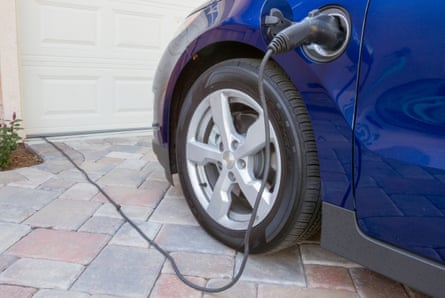Electric car owners with a charger installed at their home can sign up to a community app that allows them to share it with neighbours, while making them a little extra cash at the same time.
Designed to get local communities sharing the 300,000 privately owned electric chargers across the country, the Co Charger app puts electric vehicle owners who don’t have a charger of their own in touch with neighbours who do.
Joel Teague, the man behind it, came up with the idea after his new electric Renault Zoe arrived without its charger. A kind neighbour allowed him to use his, with Teague popping £5 in his letterbox each time.
‘The cost is terrifying’: why some young people are putting off learning to driveRead more
The app matches people with home chargers, the hosts, to “chargees” – those who would like to share them. It is free to download and it handles the whole booking process, works out how much the chargee owes the host, and makes the payment directly into their bank account.
It means a motorist living in a flat can have an arrangement with a nearby neighbour with a driveway to charge at theirsCo Charger’s Joel Teague
Since its launch in December 2020, Teague says 800 hosts have signed up. He is aiming for 3,500.
“If widespread electric vehicle adoption is going to be successful, all motorists have to have easy, convenient and dependable access to chargers. One way to make this happen is community charging,” he says.
“It means a motorist living in a flat can have an arrangement with a nearby neighbour with a driveway to charge at theirs once or twice a week, ideally overnight, when tariffs are cheaper.”
Teague says the arrangement benefits both parties. “The host can earn some extra income from renting out their charger, while the chargee gets the nearest possible experience to home charging. And they can both enjoy living in a cleaner, greener neighbourhood.”
Each host sets their own fee as an hourly rate – typically at the moment about £1.73 an hour.
When the chargee plugs their car into their neighbour’s charger, they take a photo of their dashboard showing their battery’s charge level. The app is then able to work out how long the car will take to charge until full, and bills the user accordingly, via their debit or credit card. If they stop the charging earlier, they simply pay for the hours used.
 View image in fullscreenSince its launch in December 2020, 800 hosts have signed up to Co Charger and it is aiming for 3,500. Photograph: Ellen Isaacs/Alamy
View image in fullscreenSince its launch in December 2020, 800 hosts have signed up to Co Charger and it is aiming for 3,500. Photograph: Ellen Isaacs/Alamy
Co Charger takes 12% of that payment (10% plus VAT) and pays the rest into the host’s bank account two weeks later. Teague says that chargees typically pay about 23p/kWh to charge up, which compares well with the 30p-plus that public chargers cost.
From that, hosts typically receive more than 20p/kWh, for which they are paying about 15p to their electricity supplier, generating them a small income and helping to recoup the charger’s cost.
The feedback on the app so far, Teague says, is that the payments system works well. There has only been one dispute, which came about after a chargee had changed his car, and this was soon resolved.
In County Durham, a Methodist church has recently added its charger to the site
Co Charger’s arrival is certainly timely. This week the public accounts committee said that the government had a “mountain to climb” to reach its goal of making all new cars zero-emissions by 2035. A lack of chargers is seen as the biggest barrier to the mass take-up of electric cars. Ofgem said this week that it expects 6.5 million households to buy an electric vehicle between now and 2030.
Teague is convinced that shared privately owned chargers will be a big part of the solution. Increasingly, small businesses are installing chargers and opening them up to others to use via the app. In County Durham, a Methodist church has recently added its charger to the site, and other bodies are already following suit, he says.



